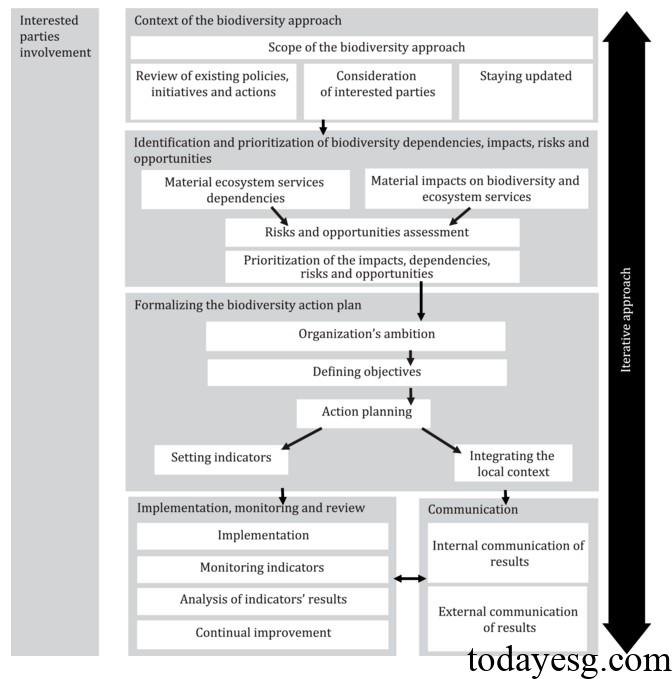ISO 17298生物多样性标准
国际标准化组织(International Organization for Standardization,简称ISO)发布全球首个生物多样性标准,旨在为组织评估生物多样性影响、依赖性、风险和机会提供指引。
ISO 17298生物多样性标准由生物多样性专家委员会制定,是全球第一个指导组织将生物多样性纳入核心战略、运营和决策过程的国际标准。
ISO 17298生物多样性标准介绍
国际标准化组织认为,全球超过一半的GDP(44万亿美元)中度或者高度依赖自然,生物多样性风险会给组织带来监管、声誉和运营风险。生物多样性行动具有紧迫性,但全球缺少一个共同标准帮助组织采取可衡量的、负责任的行动来恢复和保护生物多样性。
生物多样性标准旨在与ISO 14001环境管理体系(Environmental management systems)标准、ISO 26000社会责任(Social responsibility)标准和联合国可持续发展目标(UN Sustainable Development Goals)进行合作,并对全球生物多样性框架(Global Biodiversity Framework)产生积极作用。新标准适用于各种规模、地区和行业的组织,确保生物多样性被纳入核心治理和风险管理实践,符合全球对生物多样性的期望。
生物多样性标准的框架如下:
- 范围、参考文献、术语和定义:介绍标准适用对象、参考文献和标准中的术语;
- 生物多样性方法背景、利益相关者参与:介绍生物多样性发展、现有政策和利益相关者;
- 识别并确定生物多样性影响、依赖性、风险和机会:考虑组织对生物多样性和生态系统的实质性影响和实质性依赖,开展风险和机会评估,确认优先事项;
- 制定生物多样性行动计划:基于组织的计划制定目标,并根据目标设计行动计划;
- 沟通:与内部利益相关者和外部利益相关者沟通;
- 实施、监测和审查:实施生物多样性行动计划,监测并分析相关指标,持续提升效果;

除已经发布的ISO 17298生物多样性标准外,生物多样性专家委员会还在制定的标准包括:
- ISO 13208 生物多样性词汇;
- ISO 17317 生物多样性对本地物种进行特征描述的要求和准则;
- ISO 17620生物多样性在发展项目中设计和执行生物多样性净收益的进程;
- ISO 18244 生物多样性与食品部门:提高食品公司和食品零售商的生物多样性绩效指南;
- ISO 25182生态网络标准化需求映射;
参考链接:
ISO 17298: Biodiversity for Organizations – Guidelines and Requirements





